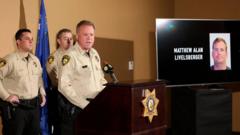The circumstances surrounding the explosion of a Tesla Cybertruck in Las Vegas have been characterized as a "tragic case of suicide," involving Matthew Livelsberger, an active-duty U.S. Army member. The FBI’s investigation indicates that Livelsberger, whose body was discovered inside the charred vehicle, suffered from post-traumatic stress disorder (PTSD), which he may have developed during his military service.
The FBI has stated that there is no evidence linking Livelsberger’s actions to any terrorist intent, and emphasized that he held no particular animosity toward President-elect Donald Trump. Official reports suggest his personal struggles, including familial issues and grievances, played a significant role in the incident.
Livelsberger, a 37-year-old Special Forces intelligence sergeant, was reportedly on an approved leave to visit his wife and eight-month-old daughter in Colorado. His father shared that their last conversation around Christmas indicated no alarming issues, contradicting the turmoil that would follow shortly thereafter. Friends and family describe Livelsberger’s experience with combat as contributing to his mental health challenges, including a traumatic brain injury he sustained while deployed.
Authorities confirmed his identity through DNA obtained from a family member after it was revealed that he had purchased fireworks on his way to Las Vegas. Surveillance video tracked Livelsberger's journey, showing he had rented the Cybertruck and purchased firearms leading up to the explosion, which resulted in minor injuries to seven bystanders.
Moreover, police recovered digital notes allegedly written by Livelsberger, wherein he expressed political grievances, urging military peers to critique their leadership and disclaiming that his explosion was an act of terrorism. Instead, he referred to it as a "wake-up call."
The investigation remains ongoing as law enforcement delves deeper into the data collected from the Cybertruck and other devices, underscoring a vital narrative on the importance of addressing mental health within military ranks, especially as returning soldiers often face complex and overwhelming challenges post-deployment. Support organizations continue to advocate for increased resources and awareness for those affected by PTSD and related issues. If you need support, resources such as the US Suicide and Crisis Lifeline can be accessed.






















